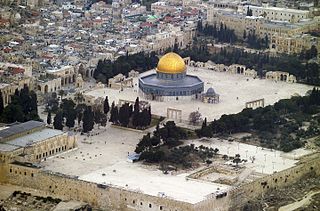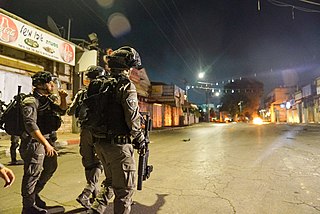
The Temple Mount, also known as al-Ḥaram al-Sharīf, al-Aqsa Mosque compound, or simply al-Aqsa Mosque, and sometimes as Jerusalem's sacredesplanade, is a hill in the Old City of Jerusalem that has been venerated as a holy site in Judaism, Christianity, and Islam for thousands of years. Since the Crusades launched by the Latin Church, the Muslim community of Jerusalem has managed the site through the Jerusalem Islamic Waqf. The site, along with the whole of East Jerusalem, was controlled by Jordan from 1948 until 1967, and has been occupied by Israel since the Six-Day War of 1967. Shortly after capturing the site, Israel handed its administration back to the Waqf under the Jordanian Hashemite custodianship, while maintaining Israeli security control. The Israeli government enforces a ban on prayer by non-Muslims as part of an arrangement usually referred to as the "status quo." The site remains a major focal point of the Arab–Israeli conflict.

The Qibli Mosque, more commonly known as al-Aqsa Mosque or Jami' Al-Aqsa, is a congregational mosque in the Old City of Jerusalem. It is located within, and commonly named after, the Masjid al-Aqsa, which is also known as al-Aqsa Mosque, the Haram al-Sharif, or the Temple Mount.
The 1990 Temple Mount riots, or the Al Aqsa Massacre, also known as Black Monday, took place at the Temple Mount, Jerusalem at 10:30 am on Monday, 8 October 1990 before Zuhr prayer during the third year of the First Intifada. Following a decision by the Temple Mount Faithful to lay the cornerstone for the Temple, mass riots erupted, In the ensuing clashes, 17 Palestinians died, more than 150 Palestinians were wounded by Israeli security forces, and more than 20 Israeli civilians and police were wounded by Palestinians. United Nations Security Council Resolution 672, which was rejected by Israel, "condemned especially the acts of violence committed by the Israeli security forces" and United Nations Security Council Resolution 673 urged that Israel reconsider its refusal to allow United Nations Secretary General Javier Perez de Cuellar to carry out an investigation.
The Department of the Jerusalem Awqaf and Al-Aqsa Mosque Affairs, together with its board the Islamic Awqaf Council, is the Jordanian-appointed organization responsible for controlling and managing the current Islamic edifices on the Temple Mount in the Old City of Jerusalem, known to Muslims as the Al-Aqsa Mosque, which includes the Dome of the Rock.
Jewish Israeli stone-throwing refers to criminal rock-throwing activity by Jewish Israelis in Mandatory Palestine, Israel, the West Bank, the Gaza Strip and Jerusalem. It includes material about internecine stone-throwing, in which Haredi Jews throw stones at other Jews as a protest against what they view as violations of religious laws concerning Shabbat, modest clothing for women and similar issues, and material about stone-throwing by extremists in the settler movement.
List of violent events related to the Israeli-Palestinian conflict occurring in the second half of 2015.
Murabitat is an illegal Islamist political movement of Muslim women, funded by the northern branch of the Islamic Movement in Israel. The group organises classes at Al Aqsa Mosque from learning how to read and write to university level and Islamic tajweed or the musical chanting of Quranic verses.

On 3 October 2015, a Palestinian resident of al-Bireh attacked the Benita family near the Lions' Gate in Jerusalem, as they were on their way to the Western Wall to pray. The attacker murdered Aaron Benita, the father of the family, and injured the mother Adele and their 2-year-old son Matan. Nehemia Lavi, a resident who heard screams and came to help was also murdered and his gun taken by the assailant. The attacker, 19 year old Muhanad Shafeq Halabi was shot and killed by police as he was firing on pedestrians.

An increase of violence occurred in the Israeli–Palestinian conflict starting in the autumn of 2015 and lasting into the first half of 2016. It was called the "Intifada of the Individuals" by Israeli sources, the "Knife Intifada", "Stabbing Intifada" or "Jerusalem Intifada" by international sources because of the many stabbings in Jerusalem, or "Habba" by Palestinian sources.
Timeline of events related to the Israeli–Palestinian conflict during 2016.
On 14 July 2017, three Arab-Israeli men left the Temple Mount, and opened fire on Israeli border police officers stationed near the Gate of the Tribes which is close to the Lions' Gate. Two Israeli border police officers were killed and two more were injured in the attack. All three attackers were shot and killed by Israeli police after fleeing back into the complex.
The Halamish attack, or the Halamish massacre was a terrorist attack on a Jewish family in the West Bank Israeli settlement of Halamish, that took place on 21 July 2017, in which three Israelis were stabbed to death and one severely wounded. The victims of the attack were Yosef Salomon, his daughter Chaya and son Elad, the three who were murdered in the attack, and Tova Salomon, Yosef's wife, who was injured but survived.

The 2017 Temple Mount crisis was a period of violent tensions related to the Temple Mount, which began on 14 July 2017, after a shooting incident in the complex in which Palestinian gunmen killed two Israeli police officers. Following the attack, Israeli authorities installed metal detectors at the entrance to the Mount in a step that caused large Palestinian protests and was severely criticized by Palestinian leaders, the Arab League, and other Muslim leaders, on the basis that it constituted a change in the "status quo" of the Temple Mount entry restrictions.

A major outbreak of violence in the ongoing Israeli–Palestinian conflict commenced on 10 May 2021, though disturbances took place earlier, and continued until a ceasefire came into effect on 21 May. It was marked by protests and police riot control, rocket attacks on Israel by Hamas and Palestinian Islamic Jihad (PIJ), and Israeli airstrikes in the Gaza Strip. The crisis was triggered on 6 May, when Palestinians in East Jerusalem began protesting over an anticipated decision of the Supreme Court of Israel on the eviction of six Palestinian families in the neighborhood of Sheikh Jarrah. Under international law, the area, effectively annexed by Israel in 1980, is a part of the Palestinian Territories; Israel applies its laws there. On 7 May, according to Israel's Channel 12, Palestinians threw stones at Israeli police forces, who then stormed the Al-Aqsa Mosque compoundl using tear gas, rubber bullets, and stun grenades. The crisis prompted protests around the world as well as official reactions from world leaders.
The following is a timeline of events during the Israeli–Palestinian conflict in 2021, including the 2021 Israel–Palestine crisis.

On 15 April 2022, clashes erupted between Palestinians and Israeli Security Forces on the Al-Aqsa Compound in the Old City of Jerusalem. According to the United Nations Special Coordinator for the Middle East Peace Process, the clashes began when Palestinians threw stones, firecrackers, and other heavy objects at Israeli police officers. The policemen used tear gas shells, stun grenades and police batons against the Palestinians. Some Palestinians afterwards barricaded themselves inside the Al-Aqsa Mosque and proceeded to throw stones at the officers. In response, police raided the mosque, arresting those who had barricaded themselves inside. In addition, some damage was done to the mosque's structure.
The Al-Aqsa mosque fire was an arson attack on Jerusalem's Jami'a Al-Aqsa, the primary prayer hall / mosque building within Jerusalem's Masjid Al-Aqsa, on 21 August 1969. The attack was carried out by Australian citizen Denis Michael Rohan, who initially set fire to the pulpit.






